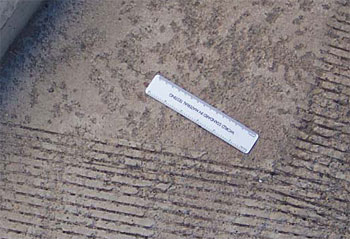Project Details
05-202, TPF-5(100)
03/01/05
09/30/08
Connecticut Department of Transportation
Federal Highway Administration
Iowa Department of Transportation
Kansas Department of Transportation
New York State Department of Transportation
Ohio Department of Transportation
Slag Cement Association
Researchers
Scott Schlorholtz
Doug Hooton
About the research
The initial phase of this project was conducted to determine whether adding slag cement to concrete mixtures increases the surface scaling caused by the routine application of deicer salt. A total of 28 field sites that included portland cement concrete pavements and bridge decks containing slag cement were evaluated. Laboratory testing was conducted on 6 in. diameter core samples extracted from 12 field sites and 3 subsites, including 6 pavement sites and 6 bridge decks. The laboratory testing program consisted of scaling tests, rapid chloride permeability tests, surface chloride profile tests, and petrographic examination. The results of this study suggest that construction-related issues played a bigger role in the observed scaling performance than did the amount of slag in the concrete mixture.
Project Details
02/01/03
12/01/07
American Concrete Pavement Association
Concrete paving industry
Federal Highway Administration
Georgia Department of Transportation
Indiana Department of Transportation
Iowa Department of Transportation
Kansas Department of Transportation
Lousiana Department of Transportation
Michigan Department of Transportation
Minnesota Department of Transportation
Nebraska Department of Roads
New York State Department of Transportation
North Carolina Department of Transportation
North Dakota Department of Transportation
Ohio Department of Transportation
Oklahoma Department of Transportation
South Dakota Department of Transportation
Texas Department of Transportation
Wisconsin Department of Transportation
Researchers
Jim Grove
Fatih Bektas
About the research
The objectives of this five-year Transportation Pooled Fund study are to evaluate conventional and new technologies and procedures for testing concrete and concrete materials to prevent material and construction problems that could lead to premature concrete pavement distress, and to develop a suite of tests that provides a comprehensive method of ensuring long-term pavement performance. A preliminary suite of tests to ensure long-term pavement performance has been developed. Shadow construction projects are being conducted to evaluate the preliminary suite of tests. A mobile concrete testing laboratory has been designed and equipped to facilitate the shadow projects. The results of the project are being compiled in a user-friendly field manual, which will be available by summer 2006.
Project Details
TPF-5(098)
09/01/04
11/30/05
Active Minerals
Federal Highway Administration
Iowa Department of Transportation
Kansas Department of Transportation
Nebraska Department of Roads
New York State Department of Transportation
W R Grace
Washington State Department of Transportation
Researchers
David White
Surendra Shah
Jiong Hu
Bekir Yilmaz Pekmezci
Gang Lu
Clinton Halverson
About the research
Over-consolidation is often visible as longitudinal vibrator trails in the surface of concrete pavements constructed using slip-form paving. Concrete research and practice have shown that concrete material selection and mix design can be tailored to provide a good compaction without the need for vibration. However, a challenge in developing self-consolidating concrete for slip-form paving (SF SCC) is that the new SF SCC needs to possess not only excellent self-compactibility and stability before extrusion, but also sufficient “green” strength after extrusion, while the concrete is still in a plastic state. The SF SCC to be developed will not be as fluid as the conventional SCC, but it will (1) be workable enough for machine placement, (2) be self-compacting with minimum segregation, (3) hold shape after extrusion from a paver, and (4) have performance properties (strength and durability) compatible to current pavement concrete.
The overall objective of this project is to develop a new type of SCC for slip-form paving to produce more workable concrete and smoother pavements, better consolidation of the plastic concrete, and higher rates of production. Phase I demonstrated the feasibility of designing a new type of SF SCC that can not only self-consolidate, but also have sufficient green strength. In this phase, a good balance between flowability and shape stability was achieved by adopting and modifying the mix design of self-consolidating concrete to provide a high content of fine materials in the fresh concrete. It was shown that both the addition of fine particles and the modification of the type of plasticizer significantly improve fresh concrete flowability. The mixes used in this phase were also found to have very good shape stability in the fresh state. Phase II will focus on developing a SF SCC mix design in the lab and a performing a trial of the SF SCC in the field. Phase III will include field study, performance monitoring, and technology transfer.


